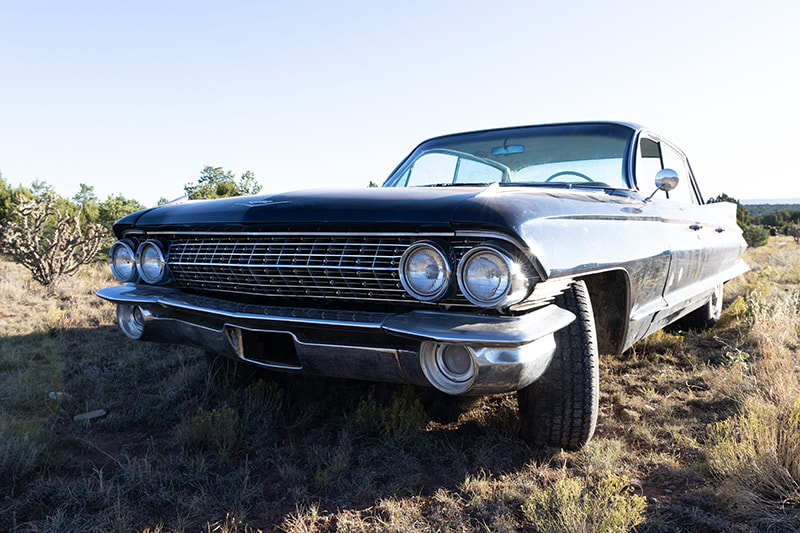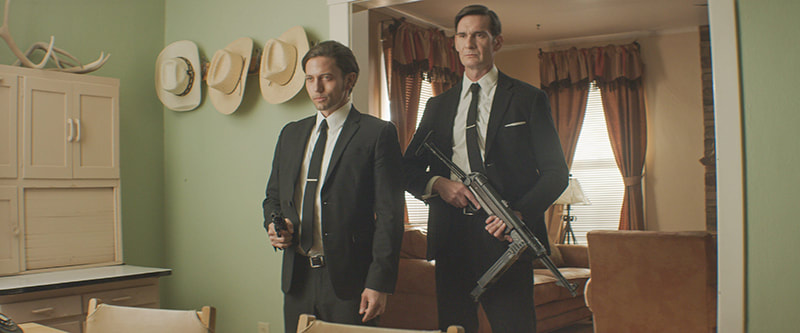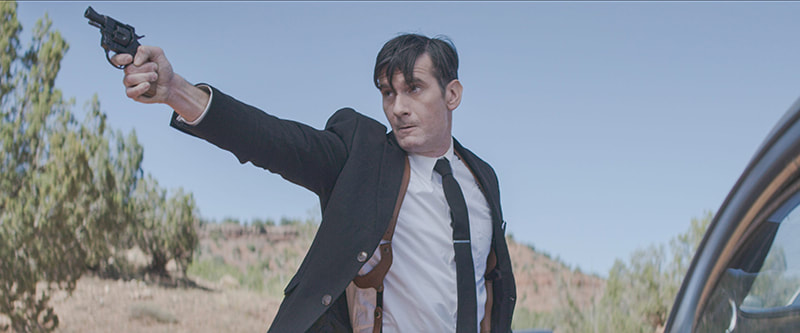|
In which I, for some reason, am trusted as a film critic. By Zach Hively Have you ever experienced the joy, the admiration, the raging jealousy of watching someone you love on stage or screen? I haven’t. (Kidding! Of course I have. I absolutely adored my little sisters’ school symphony concerts and didn’t ever even once snore.) But I got to, recently. I watched a screener of the new movie Laws of Man, and there, right there, was my beloved home state of New Mexico, playing the role of Nevada and maybe also of Utah—convincingly so, I might add, especially if you’ve never been to Nevada or maybe also Utah. This isn’t the first such time I’ve felt such pride. I’ll always remember how 2000s Albuquerque played a fine 1980 El Paso in No Country for Old Men. And it had a shining, starring role as itself in the docudrama Breaking Bad. This may not mean much to you New Yorkers and Hollywood types, but I, an informal member of the New Mexico press, am happy to qualify to review this movie based on my geography alone. And I will say this with confidence: It is, in fact, a movie. Here’s the premise:It’s 1963 in Nevada. It’s also 1963, we presume, in Utah. Two U.S. Marshals, played by the well-typecast Jacob Keohan and Jackson Rathbone, must serve a warrant on Benjamin Bonney (Dermot Mulroney, who you have seen somewhere before and you’ll spend the movie trying to remember where). It seems ol’ Bennie is murdering anyone who lives near his Nevada ranch and burning their houses down, then buying up their land at a pittance. But arresting B.B. is more complicated than the marshals expect. For starters, some flashbacks to Frank the elder marshal in World War II keep getting in their way. So do all the characters one expects to see in a town with a motel but, as far as we know, no houses: the sassy prostitute, the gentle barmaid with more going on than meets the eye, the too-cool itinerant preacher parked in an Airstream. Then the villains are pure storybook. The Bonney clan lack their daddy’s screen presence but make up for it with ominously biblical names: Noah, Ahab, and Joe. (In my defense, I thought it was Job for three-quarters of the film.) The throwaway bad guys who open the film have teeth rotting out, and they drool spittle, and they are called the Crash Mooncalf Gang, after their founding member, Moonraker. No, wait. That’s not right; Roger Moore wasn’t James Bond until the 1970s. Yet despite all the stock characters, this—as Frank tells his younger, brasher partner, Tommy—“this isn’t a cowboy movie.” “Yeah, well. Sometimes a cowboy’s what you need,” Tommy fires back. (Unspoken, but implied: “You know, like when the cattle are straying and you’ve got some beans that ain’t gonna eat themselves. You packin’ a harmonica there, pardner?”) Now, no spoilers, because frankly you wouldn’t believe me if I told you. I guess I should have put more stock in the straight-outta-Fleming villain name at the start, because there’s something fishy going on here turns real quick into a volcano-lair-level climax—but unlike a Bond-level resolution, the ending to Laws of Man is shaken, not earned. It could have been earned, though. This is what breaks my moviegoing heart. At one point, the trippy itinerant preacher (Harvey Keitel) asks Marshal Frank why he ended up at this motel. “It’s the only motel in fifty miles,” Frank says. “It was this patch of concrete or a tent.” Frank—or rather, Frank’s writers—chose not to go with Option B. This was the great mistake. Had they stuck the marshals in a tent, this whole thing would have been a whole lot campier. This reviewer, for one, could have gotten really into this flick if it had leaned into the camp already there. Campiness would have allowed them to heighten the tropes, and thereby justify them. Let the lawmen and the villains be bigger than life. Let the caricatures know they are affects. Let this ridiculous and ginned-up ending feel right at home, inevitable, instead of what-the-hellable. Either that, or lean hard into the people and forget shooting for orbit. Laws of Man was never going to be Oscar bait. But not every movie needs to be. Not every movie can be. I sometimes forget that there is cinema beyond the blockbusters. Films on low budgets. (Low in movie terms; I could still live on one of these budgets quite without complaint.) Directors trying things out and getting creative. There’s an immense freedom in blowing single-digit millions instead of three-digit millions, and in these movies we might see more of what artists really want to make instead of what executives think might sell. So I can admire Laws of Man for that. And for showing true love for the genre in places. But I can’t feel that it succeeded. Like Frank, torn between playing it straight and taking justice into his own hands, it didn’t choose a direction and commit. The real reason why the film doesn’t bring it all on home is perhaps right there in the script: “It doesn’t make sense,” Frank says of the case, but arguably also of the conclusion he senses coming. “It doesn’t have to.”
Not even New Mexico’s rock-solid performance can overcome that. Laws of Man, directed by Phil Blattenberger, is available in select theaters and on select digital streaming platforms.
0 Comments
Your comment will be posted after it is approved.
Leave a Reply. |
Submit your ideas for local feature articles
Profiles Gardening Recipes Observations Birding Essays Hiking AuthorsYou! Archives
October 2025
Categories
All
|




 RSS Feed
RSS Feed